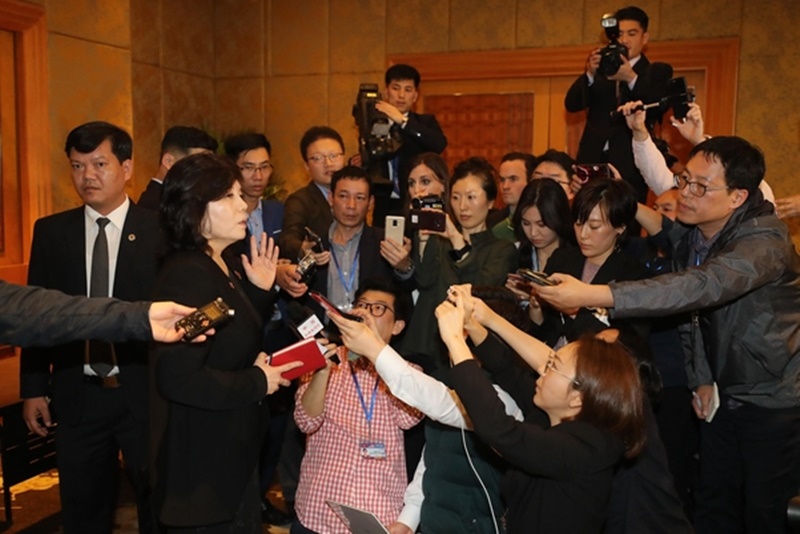
On March 15, Choe Son Hui, North Korea’s Vice Minister of Foreign Affairs, held a press conference and stated, “We have no intention to agree to America’s demands in any form.” She added that North Korea has “no considerations or plans to negotiate” in the way the US desires and that Kim Jong Un would soon make a decision about whether to continue the moratorium on nuclear and missile tests. North Korea has thus emphasized yet again that it will not agree to the all-encompassing denuclearization argued for by the US.
Choe also stated during the press conference that Kim Jong Un would soon make an official statement in regards to North Korea’s future course of action. That Kim would indeed make such a statement indicates that the country has finished its “internal review” of the direction it will take after the failure of the US-DPRK summit in Hanoi. North Korea announced its stance very recently through propaganda outlets aimed at foreign audiences. Choe’s official press conference and Kim’s expected official statement, however, are seen to hold significantly more weight.
North Korea and US continue their game of push and pull
Given that Choe criticized the US approach toward the negotiations suggests that the press conference was a way to respond to the slew of high-level US officials who have pressured North Korea through the media. Bolton, Biegun and Pompeo have continued to conduct interviews with the media to pressure North Korea to take the “big deal” the US is offering. Essentially, North Korea has responded to this pressure by saying, “no thanks.”
Despite Choe’s criticism of Bolton and Pompeo, she emphasized that the “relationship between the two leaders on a personal level is still good and their chemistry is great,” suggesting that North Korea doesn’t feel ready to break off the dialogue just yet. Thus, Kim Jong Un’s expected official statement may hint at the possibility of ending negotiations, but likely will not call them off completely. The two sides are seemingly engaged in a kind of “push and pull.”
The basis of disagreement between the two sides is the shutdown of facilities outside of Yongbyon
What is concerning at this stage, however, is that the current disagreement between the two sides originates from very fundamental differences on how to conduct the denuclearization negotiations. The reason the Hanoi talks broke down was due to the continued insistence by the US that North Korea must shut down all of its nuclear sites outside of Yongbyon. The US has continued to tell North Korea, which has only agreed to shutdown the Yongbyon nuclear site, that “shutting down Yongbyon is insufficient and genuine intent to shut down other sites is needed.” North Korea has clearly shown, however, through Choe’s official press conference that came after a long period of deliberation that the country has no intention to do so.
Given that North Korea has shown its cards, there’s a need now for the US and South Korea, the “facilitator” of the US-DPRK talks, to step in to soothe North Korea and prevent the situation from reaching a crisis. The US should aim to prevent its first response being one that angers North Korea. That the US would actually move to soothe North Korea and find areas of agreement given that North Korea still refuses to budge on the issues is doubtful, however.
The role of the South Korean government is thus one to watch. However, it appears that the South Korean government’s role as a facilitator is doubtful given that North Korea released such uncompromising statements during Choe’s press conference. Choe stated clearly during the press conference that “South Korea is America’s ally so it’s just an actor, not a mediator,” which shows that North Korea doesn’t put much weight on South Korea’s role in the process.
Despite both the US and North Korean sides making statements that promise not to break off dialogue, talks between the two will not begin again if they continue to stick to their own arguments and wait for the other side to make the first move. If time continues to pass without agreement, a period of crisis could emerge.
While it’s hard to predict where things will go from here, this recent reversal in fortunes suggests that a crisis may be brewing on the Korean Peninsula.
*Views expressed in Guest Columns do not necessarily reflect those of Daily NK.




















